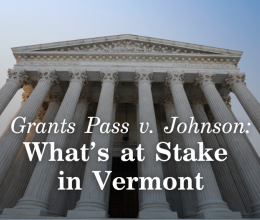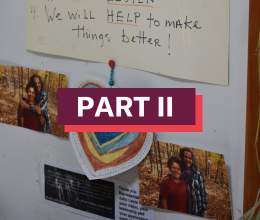
When a Vermont police officer violates someone’s rights, they should be held accountable for their actions -- and victims should be able to get the justice they deserve.
The legal doctrine of qualified immunity prevents people who are victims of police misconduct from having their cases heard when their rights have been violated. It effectively closes the courthouse doors to victims while making it harder to hold abusive officers accountable.
That’s why people from across the political spectrum – including 3 in 4 Vermonters and organizations from across the state – support ending qualified immunity.
urge your legislator to end qualified immunity in Vermont
Victims deserve their day in court
Qualified immunity requires victims of police abuse seeking justice in a civil court to first show that police violated “clearly established law.” That is, victims must be able to point to another, prior case with nearly identical circumstances, or else their case cannot go forward – even in cases where rights violations cause serious injury or death.
Experts from across the political spectrum and many law enforcement leaders agree that qualified immunity is extreme, unnecessary, and incompatible with civil rights. These are just some of the cases of police misconduct that have been thrown out due to qualified immunity:
- Shooting a child in the leg: In 2014, a group of children playing were disrupted when a several sheriff’s deputies chased an unarmed suspect into their yard. With guns drawn, the officers ordered everyone to lay on the ground. The children complied, but their non-aggressive dog did not. One of the deputies shot at the dog and missed twice, hitting the knee of a 10-year-old boy lying less than two feet away. The court prevented his family from holding the officer accountable for damages, instead granting qualified immunity because there was no prior case where a child was shot when an officer intended to shoot something else. (Corbitt v. Vickers)
- Stealing property: In 2013, officers executed a warrant and seized over $275,000 in cash and rare coins from a pair of California business owners. The officers claimed that they only seized $50,000 and denied taking any coins, leaving $225,000 unaccounted for. The Ninth Circuit granted the officers qualified immunity despite this seizure of property because no past cases held that an officer would violate the Fourth or Fourteenth Amendment if they steal property seized when executing a search warrant. (Jessop v. City of Fresno)
- Shooting a wounded man in the back, killing him: In 2011, a woman called 911 when her boyfriend, Quamaine Mason, had drawn a gun in her apartment. Police responded and were waiting with a K-9 unit outside of the apartment. When Mason emerged and put his hands up, they ordered the dog to attack and shot Mason seven times. This included two shots in the back after he was already on the ground, killing him. Though a jury determined this was “objectively unreasonable” conduct, the officer was still granted qualified immunity. (Mason v. Faul)
- Shooting a child who had a BB gun: In 2014, a fourteen-year-old boy was playing with friends in a parking lot and had a BB gun in his waistband. When a police officer arrived at the parking lot, responding to a call of a man carrying a handgun in the area, the officer drew his firearm and shouted, “Let me see your hands.” The boy pulled the BB gun from his waistband, tossed it aside, and raised his hands. The officer shot him in the shoulder. Qualified immunity prevented the family from seeking justice on their son’s behalf as there was no clearly established law. (Nelson v. Rivera)
- Tear gassing and ransacking a home: In 2011, an Idaho woman and her children came home to find police surrounding their home, looking for the woman’s ex-boyfriend. Although the officers did not have a warrant, she granted them permission to enter the home. Instead of unlocking the door and looking for the man, the officers called in a SWAT team who bombarded the house with tear gas grenades, shattering windows and the back door and covering the interior in tear gas residue. Upon entering, they tore apart portions of the home searching for the ex-boyfriend. They ultimately determined he was not there. The court held that although the woman had not consented to the bombardment and destruction of her home during this warrantless search, no previous cases showed that this behavior was beyond the scope of the search she had consented to. The officers were granted qualified immunity. (West v. Winfield)
These examples offer only a small window into the kinds of misconduct and scope of civil rights violations enabled by qualified immunity. We must take action to end this legal doctrine and ensure that officers who engage in these kinds of behaviors in our state are held accountable for their actions.
urge your legislator to end qualified immunity in Vermont
Ending qualified immunity is a racial justice imperative
As with almost every aspect of our legal system, a lack of police accountability has a disproportionate impact on Black people in Vermont. Police data shows that Black people in Vermont are stopped, searched, cited, arrested, and subjected to police violence at far greater rates than white people.
More than two in three Vermonters (69 percent) think Vermont needs to do more to address discrimination in policing. Ending qualified immunity is an indispensable step toward doing that and securing the civil rights of all Vermonters..
It’s time to take action
We have the opportunity to reimagine the role of police in our state. If we are going to do that, we must have meaningful accountability measures in place to deter and address police misconduct.
An overwhelming majority of Vermonters – 95% -- agree that police need to be held accountable when they violate someone’s rights. We are calling on legislators to advance that goal by eliminating qualified immunity during the 2022 legislative session.
A growing number of states have considered or passed legislation to end qualified immunity – Vermont should be next.
Urge your legislator to end qualified immunity in Vermont
Learn more about qualified immunity:
- Law Enforcement Action Partnership (LEAP) Letter, Calling on Congress to End Qualified Immunity
- Campaign to End Qualified Immunity: Statement by Players Coalition and Statement by Business Leaders
- Cato Institute resources on ending qualified immunity
Learn more about Vermont's work to end qualified immunity:
- Vermont polling on qualified immunity
- A one-pager for Vermont voters and legislators
- Op-ed by executive director James Lyall on 12/15/21
- Letter from Vermont organizations calling to end qualified immunity on 1/25/22
- A legislative update regarding S.254 on 1/27/22
- Op-ed on law enforcement opposition to S.254 on 2/25/22

